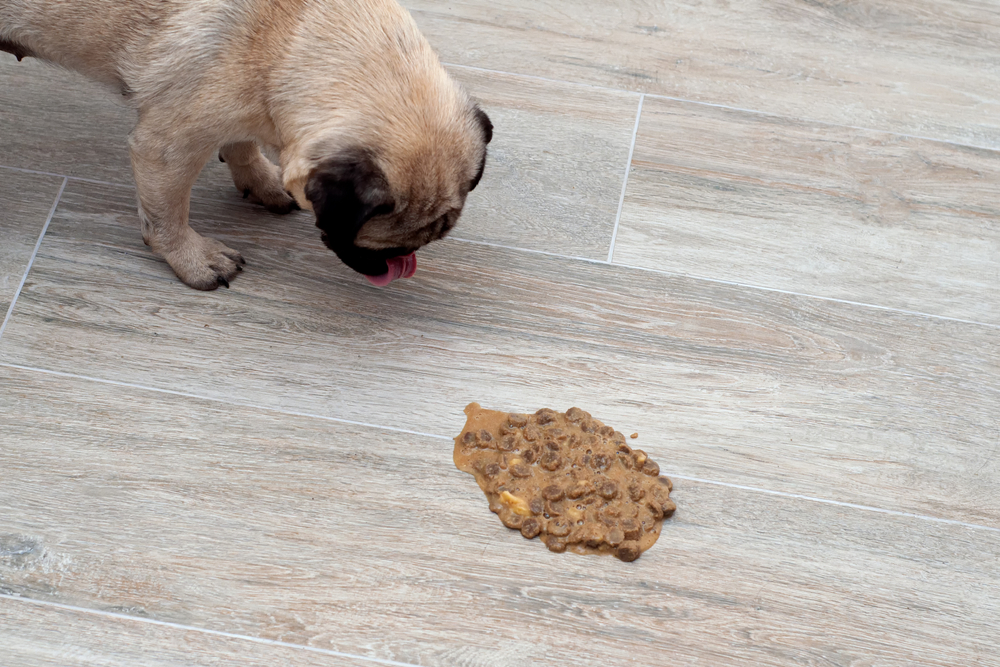If your dog is gagging but not throwing up, it could be due to swollen tonsils, which can interfere with their swallowing and gag reflex. Contact your vet if you suspect swollen tonsils as the cause.
Gagging in dogs can be mistaken for coughing or vomiting, and it may be accompanied by white foam or mucus. If the gagging persists or is accompanied by other signs, it’s important to consult a vet. Dry heaving in dogs, also known as retching, can occur without expelling any stomach contents and may be caused by gastrointestinal problems, respiratory issues, heartworms, or stress.
The treatment for gagging dogs will vary depending on the underlying cause, and medications like antibiotics, steroids, and cough suppressants may be prescribed.
Understanding Dog Gagging
If your dog is gagging but not throwing up, it could be due to swollen tonsils, which can interfere with swallowing and the gag reflex. Contact your veterinarian if you suspect your dog has swollen tonsils.
Differentiating Gagging From Vomiting
Gagging in dogs can often be mistaken for coughing or vomiting. It is important to understand the difference between these actions to properly diagnose and treat your furry friend. Gagging is characterized by a sound that resembles vomiting, sometimes accompanied by the expelling of white foam or mucous. However, unlike vomiting, nothing will actually come out of your dog’s mouth except for a small amount of mucus, which may or may not be swallowed. It is crucial to observe these symptoms carefully to accurately assess your dog’s condition and seek appropriate veterinary care.
Causes Of Dog Gagging Without Vomiting
There are several potential causes for dog gagging without vomiting. One common reason is swollen tonsils, which can interfere with swallowing and the natural gag reflex. If you suspect that your dog may have swollen tonsils, it is recommended to consult your veterinarian for an accurate diagnosis and appropriate treatment.
Other causes of dog gagging without vomiting include gastrointestinal problems, respiratory issues, heartworms, stress, and anxiety. It is important to note that each underlying cause requires different treatment approaches. Consulting with your veterinarian is vital to identify the exact cause and develop an effective treatment plan for your dog.
Depending on the reason for your dog’s gagging, the treatment plan will vary. If your dog is diagnosed with a specific disease or illness, your veterinarian may prescribe medications such as antibiotics, steroids, or cough suppressants to address the underlying issue. This individualized treatment approach will help alleviate your dog’s discomfort and promote their overall well-being.
Overall, understanding why your dog is gagging without vomiting is crucial for their health and well-being. By differentiating between gagging and vomiting and identifying the potential causes, you can ensure prompt and appropriate veterinary care for your furry companion.

Credit: www.rentecdirect.com
Identifying The Hidden Cause
If your dog is gagging but not throwing up, it could be due to swollen tonsils, which can interfere with swallowing and the natural gag reflex. Contact your vet if you suspect your dog has swollen tonsils.
Swollen Tonsils As A Possible Cause
If you find your dog gagging but not throwing up, one potential hidden cause could be swollen tonsils. Just like humans, dogs can also experience swollen and inflamed tonsils, leading to discomfort and difficulty swallowing. In turn, this can trigger repeated gagging and dry heaving in your furry friend. Swollen tonsils can be caused by various factors, including infections or allergies. If you suspect that your dog’s tonsils may be the culprit behind their gagging episodes, it’s best to consult with your veterinarian for a proper diagnosis and appropriate treatment.Other Potential Reasons For Dog Gagging Without Vomiting
While swollen tonsils are one possible hidden cause for your dog’s gagging episodes, there could be several other factors at play as well. Here are a few additional reasons why your dog might be experiencing gagging without actually throwing up:1. Respiratory issues: Dogs suffering from respiratory problems such as kennel cough or tracheal collapse may exhibit gagging as a symptom. These conditions can irritate the respiratory tract and cause your dog to gag in an attempt to clear their airways.2. Foreign object in the throat: Sometimes, your curious pup may accidentally swallow a small object that gets stuck in their throat. This can trigger gagging as the dog tries to dislodge the object.3. Pneumonia: Dogs suffering from pneumonia may gag as a result of the inflammation in their lungs. Additionally, the accumulation of mucus and fluid in their respiratory system can contribute to the gagging episodes.4. Heart disease: Certain heart conditions can lead to fluid build-up in the lungs, causing your dog to gag without vomiting. If your dog shows signs of coughing, fatigue, and difficulty breathing, it’s essential to have their heart health evaluated by a veterinarian. 5. Bloat: Gastric dilatation-volvulus, also known as bloat, is a potentially life-threatening condition in dogs. Alongside other symptoms like distended abdomen and restlessness, dogs with bloat may experience gagging as a result of the pressure on their stomach.6. Intestinal parasite infestation: Some intestinal parasites, such as roundworms or hookworms, can cause irritation in the intestines, leading to gagging or retching.7. Tonsillitis: As mentioned earlier, swollen tonsils can contribute to dog gagging. Tonsillitis, specifically the inflammation of the tonsils, can result in discomfort and frequent gagging episodes.8. Blockage due to a tumor: In rare cases, a tumor or growth in the throat or esophagus can obstruct the normal passage of food and fluids, causing a dog to gag without vomiting.Remember, if your dog is experiencing persistent gagging or if the gagging is accompanied by other concerning symptoms, it is crucial to seek veterinary attention. A professional can properly diagnose the hidden cause and recommend an appropriate course of action to improve your dog’s well-being.Seeking Treatment For Dog Gagging
If your dog is gagging but not throwing up, it could be due to swollen tonsils causing a sore throat. This can interfere with your dog’s swallowing and natural gag reflex. Contact your vet if you suspect swollen tonsils.
When To Be Concerned About Dog Gagging
If your dog is experiencing frequent gagging episodes, it’s important to know when to be concerned and seek veterinary attention. Gagging in dogs can be mistaken for coughing or vomiting, but if it persists or is accompanied by other signs such as difficulty breathing, loss of appetite, lethargy, or changes in behavior, it is advised to contact a vet. Gagging could be a sign of an underlying health issue that requires medical intervention.Treatment Options For Dog Gagging
The treatment plan for dog gagging depends on the underlying cause. To determine the appropriate treatment, it is important to consult a veterinarian who can diagnose the specific issue. Once the cause is identified, various treatment options may be considered. For short-term conditions, such as respiratory infections or allergies, medications like antibiotics, steroids, and cough suppressants may be prescribed. In cases where there is an obstruction, surgery might be required to remove the foreign object. Additionally, if the gagging is caused by gastrointestinal problems, dietary changes or medication may be recommended. Treatment options will vary depending on the individual dog’s condition, so it’s crucial to consult a professional for an accurate diagnosis and tailored treatment plan.
Credit: www.amazon.com

Credit: oliveranimalhospital.com
Frequently Asked Questions On Why Is My Dog Gagging But Not Throwing Up
What To Do If My Dog Keeps Gagging But Not Throwing Up?
If your dog keeps gagging but not throwing up, it could be due to swollen tonsils, causing a sore throat and interfering with their swallowing and gag reflex. Contact your vet if you suspect swollen tonsils. Persistent gagging or if accompanied by other signs should also prompt a vet visit.
Treatment will vary depending on the cause, and medications like antibiotics or cough suppressants may be prescribed.
When Should I Be Concerned About My Dog Gagging?
If your dog is gagging without throwing up, it could be due to swollen tonsils or other underlying issues. Swollen tonsils can interfere with swallowing and the gag reflex. Contact your vet if your dog has repeated gagging or if it is accompanied by other signs.
Why Does My Dog Act Like He’s Gonna Throw Up But Doesn T?
Dry heaving in dogs may occur due to various factors such as gastrointestinal issues, respiratory problems, heartworms, stress, or anxiety. Swollen tonsils can also cause repeated gagging and dry heaving. If your dog experiences persistent dry heaving or other accompanying symptoms, it is advisable to consult a veterinarian for further evaluation and guidance.
How Do You Treat A Dog That Is Gagging?
If your dog is gagging without throwing up, it may be due to swollen tonsils or a partial obstruction in their throat. Contact your vet for proper diagnosis and treatment. Treatment may include medications such as antibiotics, steroids, or cough suppressants, depending on the underlying cause.
Conclusion
If your dog is gagging but not throwing up, it could be due to various reasons such as swollen tonsils, respiratory issues, gastrointestinal problems, or even stress and anxiety. It is important to closely observe your dog’s behavior and contact a vet if the gagging persists or is accompanied by other symptoms.
Depending on the underlying cause, the treatment plan may include medications or other interventions. Remember, always consult with a professional to ensure the well-being of your furry friend.



